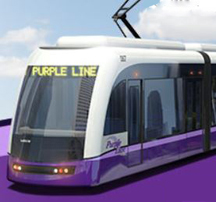ACT Opposes Transportation Policy Area Review
Dear Councilmembers Floreen, Elrich, and Leventhal:
Just as in our testimony of April 2012 to the Planning Board, the Action Committee for Transit is unable to support the Transportation Policy Area Review (TPAR). Yes, the policy would generate more revenue for transportation projects; however the funds raised will shift control of transportation spending priorities away from the County Council and away from the voters. We want the County Council to maintain control of how the newly raised monies are appropriated.
In recent years, Montgomery County has entered a land use framework that is unprecedented in its history: infill. In previous decades, we would build roads over undeveloped land then watch the car-dependent subdivisions and strip malls sprout up seemingly overnight. Our county no longer has undeveloped land outside of our Agriculture Reserve, and we support maintaining the Reserve in the strongest terms possible. Transportation planning should reflect this change in the paradigm for our county. Both our 20- and 30-something generations and our Baby Boomer residents planning for retirement are demanding more transit investment. If we want to attract tomorrow's jobs and residents, we must make transportation planning funding decisions that will provide our duly elected County Council the flexibility to invest in the infrastructure that is already popular and in high demand.
If the Council goes ahead with this tax plan, we concur with the staff recommendation that payment funds need not be restricted to a County project or service and we also urge that the funds not be restricted to any single policy area. Usually the most cost-effective improvement will be a transit project. For example, the way to address the massive congestion on US 29 is clearly not to build more lanes (so that commuters from Howard County have a more convenient commute). As staff has said, sometimes the best – or only available—means to address road network inadequacy is to build a transit line to reduce traffic significantly. Further, because traffic problems are frequently inter-jurisdictional, transportation improvements may require solutions that extend outside the policy area. TPAR payments must be used flexibly. Our concern is that these decisions not be left up entirely to the MCDOT, but rather that the Council has a say, and thereby the voters, in what major transportation initiatives are planned for the future.
We appreciate the lengthy work that has gone into the TPAR policy and appreciate this opportunity to register our comments. But we must oppose the proposal before the Council.
Sincerely,
Tina Slater
Action Committee for Transit, President

